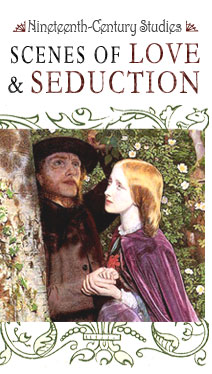T. J. Edelstein , from "Augustus Egg's Triptych: A Narrative of Victorian Adultery," Burlington Magazine (1983)
Transcribed from pages 202, 207-08 of T.J. Edelstein's "Augustus Egg's Triptych: A Narrative of Victorian Adultery" from Burlington Magazine 125 (1983).
1.
"In the corner of one painting exhibited in the Royal Academy of 1858, two young girls build a house of cards on top of a book whose spine is labelled 'Balzac.' This fragile edifice is the most vivid symbol of the iconology of Augustus Egg's untitled narrative cycle of three paintings identified in the catalogue by the following passage: 'August the 4th. Have just heard that B— has been dead more than a fortnight, so his poor children have now lost both their parents. I hear she was seen on Friday last near the Strand, evidently without a place to lay her head. What a fall hers has been!'
These paintings have often been classified in secondary literary as . . . depicting the theme of the fallen woman, in company with such images as William Holman Hunt's The Awakening Conscience" (202).
2.
"The book which forms the foundation for the house of cards might seem to provide the literary basis for the series, since its spine is clearly labelled BALZAC. It stands, however, not for a specific literary source, but for the very phenomenon of adultery. . . . In 1836, J.W. Crocker, describing countless incidents of adultery in Balzac, stated, 'A baser, meaner, filthier scoundrel never polluted society than M. de Balzac's [sic] standard of "public morals",' an opinion echoed in the Foreign Quarterly Review in 1844:
The French themselves were aware of this English view of morality. Hippolyte Taine, in his Notes on England, made on a trip he took in 1861, remarked on the importance of the institution of marriage to the English and the supposed contrast with the French:
By placing the volume in the centre of this Victorian drawing room, Egg pointedly compares the amorality of Balzac with the theme of his own narrative, that adultery destroys the home and family. He suggests the extent to which adultery, that supposed mainstay of the French novel, has infiltrated English life.








